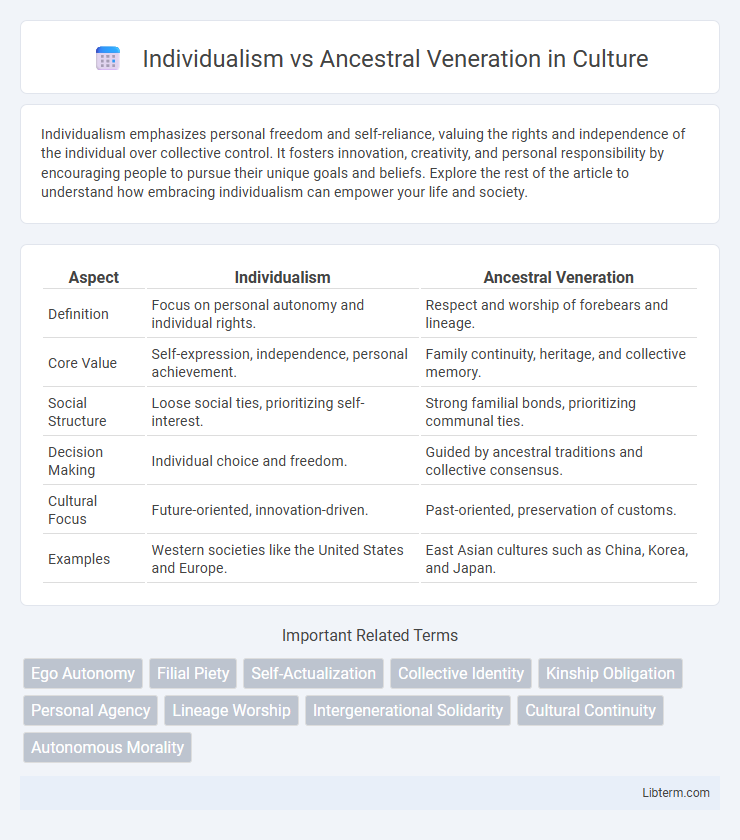Individualism emphasizes personal freedom and self-reliance, valuing the rights and independence of the individual over collective control. It fosters innovation, creativity, and personal responsibility by encouraging people to pursue their unique goals and beliefs. Explore the rest of the article to understand how embracing individualism can empower your life and society.
Table of Comparison
| Aspect | Individualism | Ancestral Veneration |
|---|---|---|
| Definition | Focus on personal autonomy and individual rights. | Respect and worship of forebears and lineage. |
| Core Value | Self-expression, independence, personal achievement. | Family continuity, heritage, and collective memory. |
| Social Structure | Loose social ties, prioritizing self-interest. | Strong familial bonds, prioritizing communal ties. |
| Decision Making | Individual choice and freedom. | Guided by ancestral traditions and collective consensus. |
| Cultural Focus | Future-oriented, innovation-driven. | Past-oriented, preservation of customs. |
| Examples | Western societies like the United States and Europe. | East Asian cultures such as China, Korea, and Japan. |
Understanding Individualism: Core Principles and Origins
Individualism emphasizes personal autonomy, self-expression, and the pursuit of individual goals, rooted in Enlightenment ideals and Western philosophical traditions. It prioritizes the rights and freedoms of the individual over collective or familial obligations, fostering innovation and personal responsibility. The core principles originate from thinkers like John Locke and Jean-Jacques Rousseau, who advocate the inherent value and rights of the individual within society.
The Foundations of Ancestral Veneration
Ancestral veneration is rooted in the belief that deceased forebears maintain an active role in the lives of their descendants, providing guidance, protection, and wisdom. This practice emphasizes family lineage, cultural heritage, and communal identity, contrasting sharply with the individualistic pursuit of personal autonomy and self-expression. Rituals and offerings serve as tangible foundations, reinforcing social cohesion and intergenerational continuity within societies that prioritize collective memory over isolated individualism.
Historical Perspectives: From Collective Traditions to Personal Autonomy
Historical perspectives reveal a shift from collective traditions rooted in ancestral veneration to an emphasis on individualism and personal autonomy, reflecting broader societal changes. Traditional societies often prioritized communal values, where ancestors were central to identity and social cohesion, guiding moral and cultural norms. Over time, increasing urbanization, modernization, and philosophical movements like the Enlightenment promoted self-expression and individual rights, reshaping the balance between collective heritage and personal freedom.
Key Philosophical Differences Between Individualism and Ancestral Veneration
Individualism emphasizes personal autonomy, self-expression, and the pursuit of individual rights, whereas ancestral veneration prioritizes collective identity, respect for lineage, and the preservation of familial and cultural heritage. Individualism promotes innovation and personal responsibility, contrasting with ancestral veneration's focus on tradition, continuity, and communal obligations. These opposing values shape worldview frameworks, influencing social roles, ethical decisions, and the balance between independence and interconnectedness.
Social Structures: Family, Community, and the Self
Individualism emphasizes personal autonomy and self-expression, reshaping social structures by prioritizing the nuclear family and individual goals over collective obligations. In contrast, ancestral veneration fosters intergenerational connectedness, where extended family networks and community bonds are central, reinforcing social cohesion through shared rituals and respect for forebears. These differing values influence identity formation: individualism centers on the self as an independent entity, while ancestral veneration integrates the self within a continuum of familial and communal heritage.
Impact on Identity and Belonging
Individualism emphasizes personal autonomy and self-expression, fostering a sense of identity rooted in unique traits and achievements. Ancestral veneration strengthens collective identity by connecting individuals to a shared lineage, traditions, and cultural heritage, reinforcing a strong sense of belonging. The interplay between these concepts shapes how individuals perceive themselves within society, balancing personal freedom with communal ties.
Rituals, Customs, and Expressions of Ancestral Honor
Rituals of ancestral veneration often include offerings such as food, incense, and prayers performed at family altars or gravesites to honor and connect with forebears. Customs can involve ceremonial festivals like Qingming in China or Obon in Japan, where participants engage in acts of remembrance and renewal of lineage bonds. Expressions of ancestral honor are deeply embedded in cultural identity, emphasizing collective memory through storytelling, genealogy preservation, and ritualistic respect that contrasts with the personal autonomy emphasized in individualism.
Modern Challenges: Navigating Conflicting Values
Modern challenges in balancing individualism and ancestral veneration arise from the tension between personal autonomy and communal traditions deeply rooted in ancestry and cultural heritage. Navigating conflicting values demands a nuanced understanding of how contemporary societies prioritize self-expression while honoring collective memory, often requiring adaptive frameworks that respect both innovation and continuity. Effective reconciliation strategies include inclusive dialogues that integrate individual rights with ancestral customs, fostering social cohesion amidst evolving cultural landscapes.
Individualism and Ancestral Veneration in Contemporary Society
Individualism in contemporary society emphasizes personal autonomy, self-expression, and the pursuit of individual goals, often prioritizing personal identity over collective heritage. Ancestral veneration remains significant in many cultures, fostering a deep connection to lineage, tradition, and communal values that shape moral frameworks and social cohesion. The coexistence of individualism and ancestral veneration reflects modern tensions between innovation and tradition, influencing cultural identity and social behavior worldwide.
Toward Balance: Integrating Personal Growth with Heritage
Integrating personal growth with ancestral veneration creates a balanced approach that honors heritage while fostering individualism. Emphasizing self-discovery alongside respect for traditions allows individuals to form identities rooted in cultural legacy yet open to innovation. This synthesis promotes a harmonious coexistence where heritage enriches personal development rather than constraining it.
Individualism Infographic

 libterm.com
libterm.com